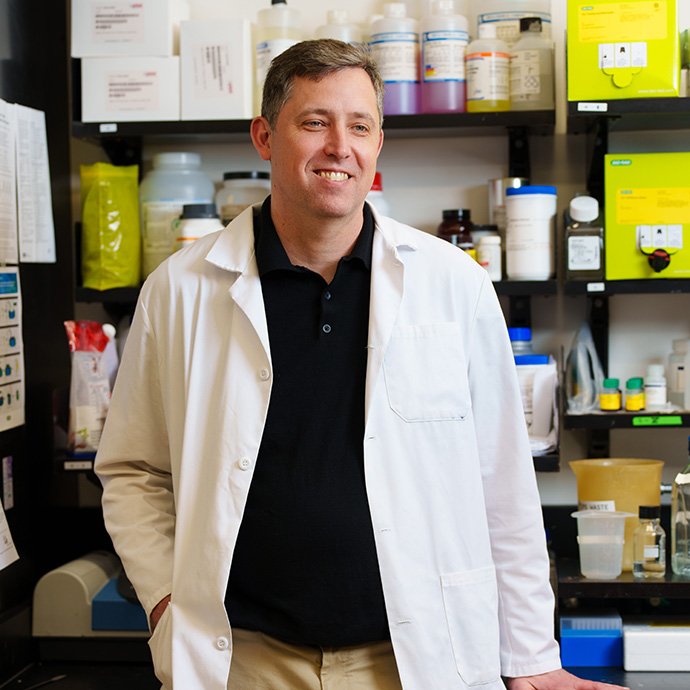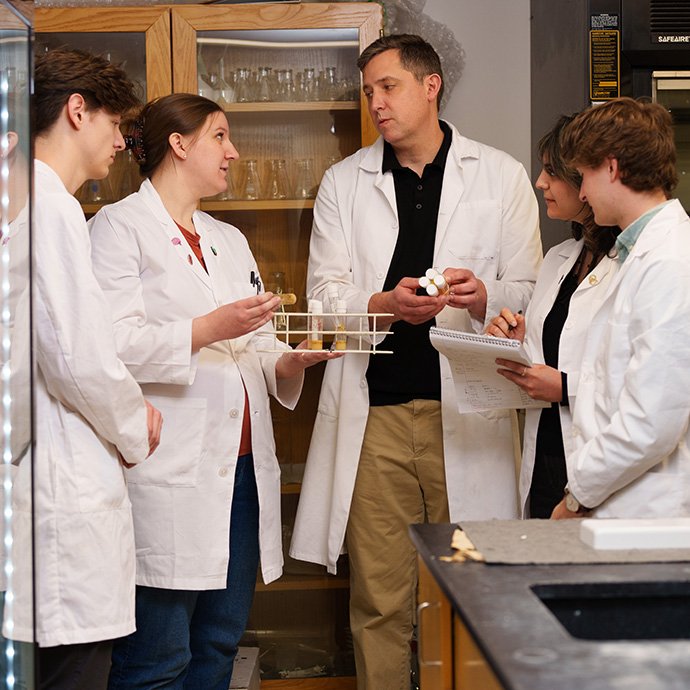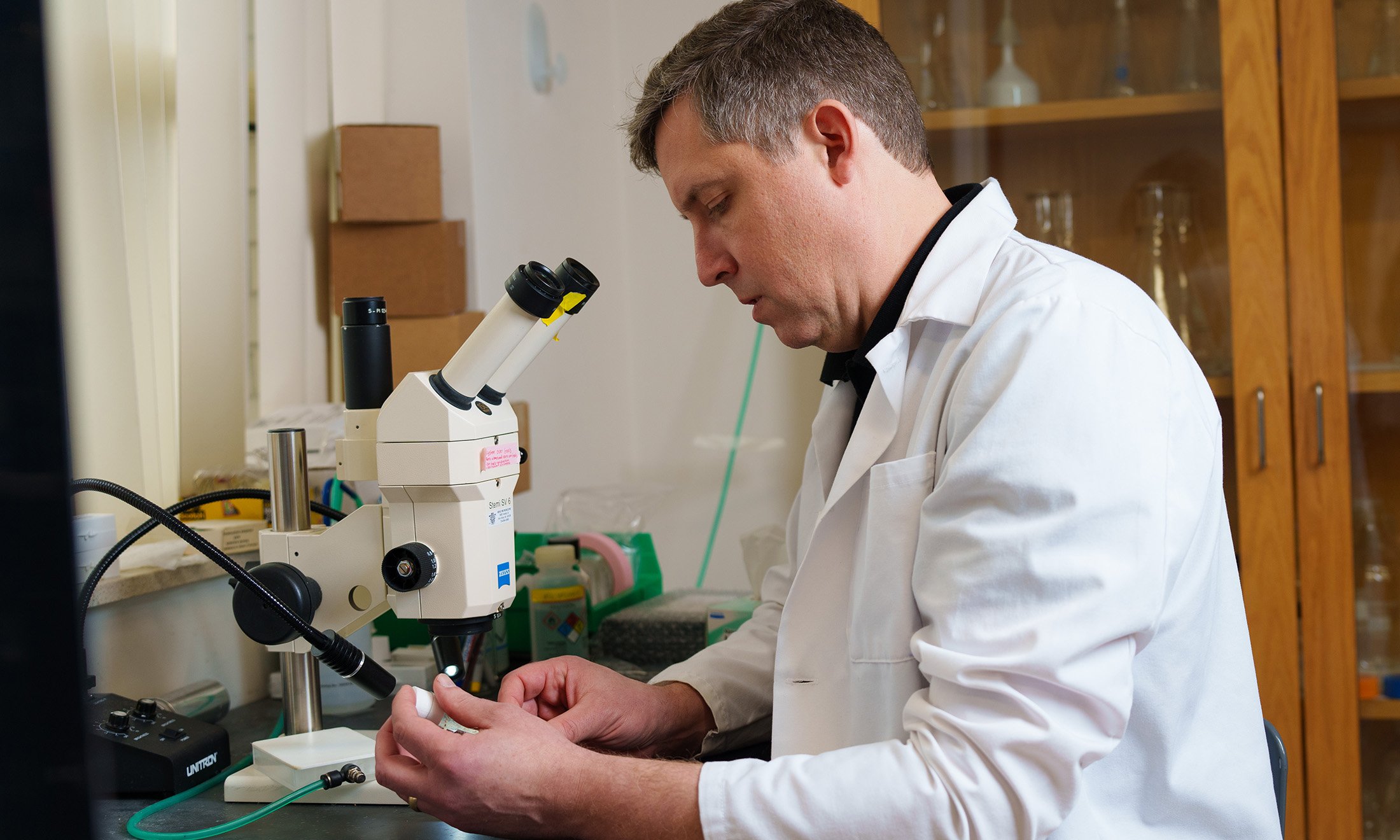Home Again
Venturing out to fulfill research aspirations brings OU alum full circle
Don’t be caught wearing apparel that supports sports teams other than the Golden Grizzlies in classes taught by Assistant Professor Adam Avery, Ph.D., CAS ’01.
“I tell my students that if I see that, they may not pass the class,” teases Dr. Avery.
Despite the lighthearted kidding, Avery is serious about conveying to students how far-reaching their Oakland University education is. Away for nearly 20 years acquiring research training since receiving his OU biochemistry degree, Avery is back on his favorite campus.
A faculty member within OU’s Department of Chemistry since 2019, Avery pours a world of research expertise back into the OU community. “It’s great to be back,” he says. “It seems like a lifetime ago, but I still see myself in the students. I’ve had some of the same professors they have, and I also grew up in this area.”
Staying Power
Coming to OU to pursue chemistry, Avery wanted the benefits of a distinguished but smaller university, including more one-on-one time with faculty. That time greatly benefited Avery when OU instructor and mentor Kathleen Moore, now retired, convinced Avery to pursue a biochemistry degree. “She felt it would give me flexibility in multiple fields, which it’s done,” he says.
 |
Avery’s first research exposure came junior year, working in an immunology lab alongside biological sciences faculty.
“Although my work on developing a vaccine for a parasitic infection didn’t lead to a breakthrough, that experience made me realize I wanted to pursue research,” Avery says. “My ability to talk in-depth about immunology made me a more attractive graduate candidate.”
Avery appreciates the staying power his alma mater has had in each leg of his career journey — right from the start.
“In the very first graduate class I had — within the University of Michigan’s biomedical sciences program — I received the top grade,” Avery recalls. “I share this with students so they know how thoroughly OU prepares them to be competitive.”
A fellow on a National Institute of Health training grant and as part of the grad program, Avery interned at a small biotech company that specialized in cell-based assays (panels) to support drug screening, which led to a job offer as a research scientist. Although a worthwhile experience, Avery later felt a pull back to academic research. In 2012, he took a postdoctoral position at the University of Minnesota.
Once at his new post, Avery was delighted to connect with another OU alumnus conducting research there — Harry Orr, CAS ’71, a world-renowned researcher who became another invaluable OU-related mentor.
Avery’s post-doctoral work involved the molecular genetics of spinocerebellar ataxia, a neurodegenerative disease. Near the end of Avery’s postdoctoral position, he developed a cell-based assay, which advances the goal of an eventual treatment for the disease. Recently, a patent was issued for the assay technology.
In collaboration with the University of Minnesota faculty, Avery’s research work at OU is a synthesis of his training in protein biochemistry, cell and genetics biology, and drug screening.
A Warm Welcome
Returning to OU has been uplifting for Avery.
“Faculty warmly received me, and I’m honored to be back here,” Avery says. “It also meant a lot to me when former OU mentors welcomed me back over lunch. They’ve greatly influenced my successes. It’s important to me that I live up to their excellent standards.”
 |
| Adam Avery with lab students |
In his teaching role, Avery is diligent about reviewing and expanding student textbook materials, but he finds sharing his research most fulfilling. “Textbooks can quickly become outdated, but research never is, and lab work is the best way for students to apply concepts,” he says.
Coming full circle to be the one to guide students has been rewarding. “I encourage them to study hard, soak up lab and internship opportunities, and stretch themselves with campus activities and clubs,” he says.
Avery also advises that small risks are sometimes necessary.
“After graduating, students may need to get outside their comfort zones to foster independence and new perspectives — perhaps take a job in another state or across the country,” Avery says.
Sometimes, though, there’s ample reason to stick around.
“A grad student I recommended continuing her post-doc work at OU has found her niche here, happily engaged in research, presenting and publishing,” Avery explains.
Whatever the trajectory of growth for each student, Avery is scientific proof that you can come home again — and it can be even better the second time around.
More Like This: |


 March 05, 2024
March 05, 2024
 By Mary Gunderson-Switzer
By Mary Gunderson-Switzer
